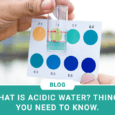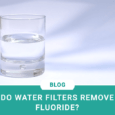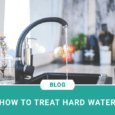What is hard water? Is it toxic? Can we change its properties? Where do we find it? All of these are normal and frequent questions that people ask us. Once you start to really interest yourself in „water-related“topics like dehumidifiers, filters, distillers, water safety and more, you’ll notice that there are some terms that just tend to appear over and over again.

One of those is hard water. Let’s find out, once for all, what is hard water exactly. Let’s answer the above-mentioned questions, see whether it’s toxic or not and learn how we can make sure our water is completely safe.
Hard water vs. Soft water
Typically, when we talk about hard water, we need to give context. Hard water is essentially just regular water with more minerals. It accumulates these from the moment it leaves the source and starts to travel around.
It’s easy for water to absorb everything and some of the more frequent „visitors“ of your water are chalk, dirt, sand, calcium, iron, magnesium, organic compounds and more. Some of these arrive from the soil, while some are from your plumbing.
Soft water would be your „normal water“ right when it leaves the source. It’s a bit saltier, has fewer minerals, but it’s much cleaner. It’s less contaminated.
The main difference, as we said before, are minerals. These will create a slight difference in taste, but the biggest difference is noticeable with long term use. If your whole house had hard water, you’ll easily notice that because you’ll see white residue, weird spots, and rough clothes.
The pros and cons of hard water
The pros
There is a lot of things we can point out here, but the most important one is that hard water is very rich in minerals. It has those essential minerals that we need to function: calcium, iron and magnesium. It’s suitable for drinking, and some even say that it will prevent certain heart diseases. To most people, hard water has better taste and they are more used to it as well.
The cons
The cons are mostly related to long-term use. You’re going to notice spots on your dishes, limescale, weird soap residues and more. There have been studies that also prove that hard water can use more energy because of different ions in it. Many people feel like their skin, hair and nails get very dry when they use hard water, so this is also a problem, especially if you have acne, eczema, rashes or other skin problems.
Is my water hard?
Maybe you haven’t noticed that your sink, pipes or plumbing are changing color. There are no weird residues and you can’t be sure whether your water is hard or not. Well, thankfully, there is science and you can easily check this.
Method 1 is getting a test kit. You just have to order it online or ask your local water provider where to get it. It’s a strip that has to be put in water and they let you know how hard the water you have is. This is related to the water’s pH and that’s how the chemical part of the test works. It’s cheap, easy and quick. Hard water, just for information, has anywhere between 120 to 180 milligrams of dissolved atoms per liter.
Method 2 is sending a sample to a lab. This is a bit more expensive, but a whole lotta specific. If you’re not that worried about the hard/soft situation, maybe you want to know more about the heavy metals or organic compounds that are in your water.
Method 3 is testing it with your senses. Check for any stains, any chalky residue, any discoloration in your shower or your sink. Smell your water – is there a bleach-like, metal-like smell? Look at it. Is there any weird residue when you put it in a glass, especially after boiling.
How to get rid of hard water?
Hard water is something that you can solve in different ways, using different methods. Today we’re presenting you with the most popular one and you can see whether it seems practical to you.
Water softeners/filters are devices that filter out a certain something from your water. If you’re getting a softener, this means that you’re essentially getting a filter that removes specific ions and minerals to make water soft. That’s why these are perceived as pretty much the same thing.
You can get water softeners that get installed in your plumbing, you can get water softeners that are attachable to your faucet. You can get a shower one as well. Some people get filters for their whole house! You should investigate water filters and you’ll surely come across those that are marketed as „softeners“.
You should know that there is something called „temporary hard water“. It’s water that changes properties for a short period of time because bicarbonate minerals have dissolved in it. This can be fixed by adding other ions to boiling the water.
Summary
Hard water shouldn’t be a problem for most people. If it’s a concern for you, we assure you that it’s fixable. Learn more about it, how to prevent it and whether it is harmful to those who drink it daily. Make sure to read other people’s reviews and see whether you find any gadgets that really fit you.




